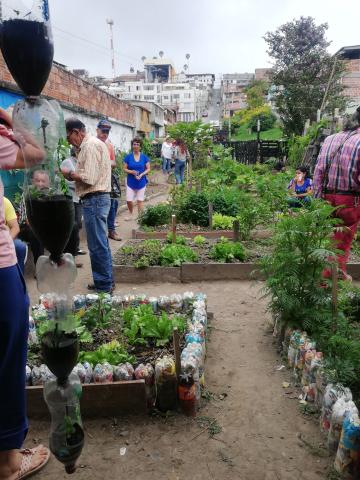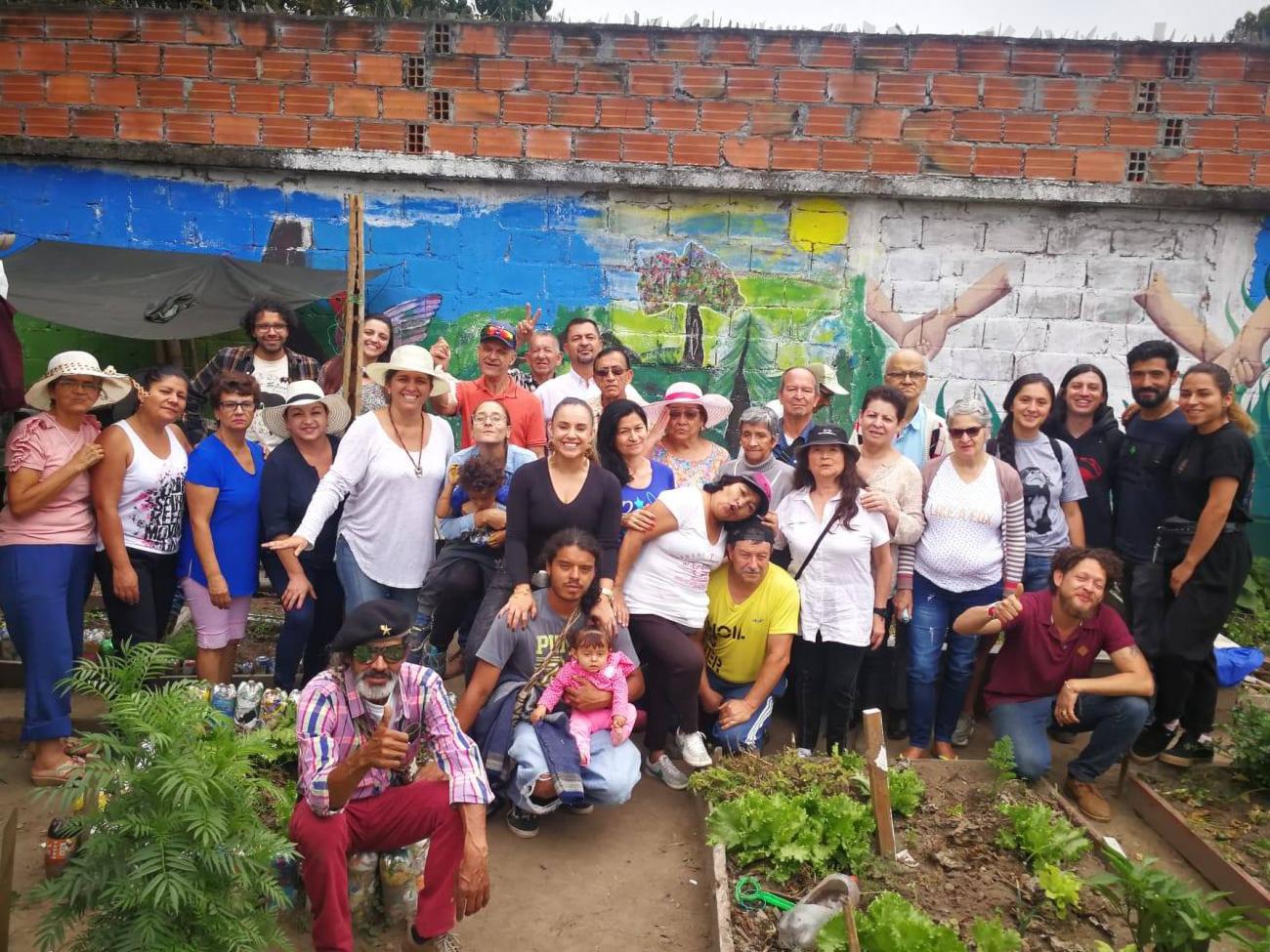In Caldas District, Colombia a Social Primary Health Care approach has been very successful in supporting communities to lead healthier lives and access the health services they need. Since 2013, Caldas has introduced 54 Social Care Centres.
Primary health care is fundamental to achieve universal health coverage. This community-centred model gives priority to strengthening the local environment, which provides protection and care to everyone.
Caldas District now has the best health indicators for the whole country, and the Social Primary Health Care approach will now be rolled out across Colombia as a whole.
PAHO WHO has worked closely with the Ministry of Health in Colombia to document and analyse the positive changes in Caldas District in order to inform a nationwide strategy.
The important thing about every initiative is to be able to give it continuity. PAHO supports the process of documentation and systematization, which helps Caldas advance this initiative at national and international levels.
Thanks to the implementation of social actions tailored to people’s needs, their health and welfare have improved.
In Villamaria, the Social Primary Health Care Strategy allowed us to identify, for the first time, the main causes of disease among our people, and to take effective action to avoid them
In Villamaria, a town of 67 000 inhabitants in Caldas District, Colombia, people’s health was suffering as a result of physical inactivity, unhealthy diets and the consumption of hallucinogens. In 2013, when the government implemented its Social Primary Health Care Strategy things began to change.
Today, the towns-people enjoy a healthier diet by eating vegetables and fruit grown in communal gardens. They have learnt to exercise twice a week, and encourage young people to take part in activities like music, acting and art so that they no longer take hallucinogens for recreation.
Villamaria is just one example among many of the success of the Social Primary Health Care Strategy implemented across the District of Caldas in the middle of Colombia, which has a population of about one million. The Social Primary Health Care Strategy focuses on improving people’s health through both identifying the causes of potential ill health and providing comprehensive health services. The approach encompasses important social issues such as entertainment, sport, education, cultural actions, home improvements, basic sanitation and road infrastructure as well as providing the health services that people need in their communities. It treats health as a societal and community issue, not just a medical issue.
The approach encompasses important social issues such as entertainment, sport, education, cultural actions, home improvements, basic sanitation and road infrastructure as well as providing the health services that people need in their communities. It treats health as a societal and community issue, not just a medical issue.

Since 2013, the district government of Caldas has focused their efforts on municipalities that were struggling the most with health and welfare issues. A team of researchers from the Department of Public Health of the School of Science for Health, Caldas University carried out analysis of 72% of families in the municipalities to identify how social determinants of health – such as culture, sanitation, education, infrastructure - affect them.
They then identified the health and welfare priorities of families and communities who are most in need in order to implement the Social Primary Health Care Strategy. This targeted approach ensured a more equal distribution of health opportunities and benefits than before, encouraged a multi-sectoral approach to tackle health issues and sought genuine community participation in finding solutions.
Social Heath Care Centres in Caldas District
Implementing a primary health care approach is fundamental for achieving Universal Health Coverage (or Universal Health as it is known in the Americas). In Caldas District, the implementation of this strategy since 2013 has meant that communities experiencing the biggest inequities in health are receiving the most attention. In the spirit of the Sustainable Development Goals to leave no one behind, this is a laudable effort. Since 2013, 54 Social Health Care Centres have been introduced to bring local and national efforts together in one place to improve people’s quality of life. The Social Health Care Centres prioritise different interventions according to the health risks and needs of the community.
This includes educational activities such as Cuídate-Cuídame or ‘Take Care of Yourself and Myself’, entertainment and sports, cultural events, specific health promotion and disease prevention activities, and educational workshops focused on lifestyle. In addition, there is rehabilitation, home-based care, health care in social programmes in local administrations, and other health services. All these activities are led by and receive support from the municipalities to encourage the greatest participation of local actors and sector
This model can also be called a ‘welfare generation’ model as it takes the family as the core from which to intervene, analyses risk and opportunities for health protection, and encourages community participation in finding solutions to their own health problems.
Ensuring a strong focus on community and society puts priority on the settings giving the most appropriate and effective forms of care. It allows for interventions to focus on the most vulnerable people in the community, who have historically been overlooked in social and health care.
According to the think-tank Así Vamos en Salud, Caldas District now enjoys the best health indicators of the whole country which include user perception, health financing, institutional performance, citizen participation and governance. Juan Pablo Uribe Restrepo, former Minister of Health and Social Protection called the strategy, “An effective intervention which brings welfare to the citizens” and said that this model should be rolled out nationwide.
Learning from Caldas
The experience of the communities in Caldas to improve their health through this social primary health
care model is of great interest to the government, who are keen to spread the impact to other parts of the country.
Since 2018 the Pan-American Health Organization (PAHO), a regional office of WHO, has been working with the Ministry of Health in Colombia to capture the knowledge and learning of the Caldas experience. The project takes into account different stakeholders involved in the implementation of the strategy to develop new collective nowledge, build learning processes and document ideas from experiences, data and other information.
This systematic approach to identifying and analyzing the Caldas experience will support implementation of Social Primary Health Care successfully in other districts of Colombia. Some improvements are due to changes in the comprehensive health care model; others are as a result of
cultural, social, financial and environmental shifts. There is also new learning to be found in the different educational and training processes that took place.

Better health in Neira Municipality
A great example of how people’s lives have changed for the better can be found in Neira Municipality. Researchers and the Social Observatory gathered and analysed socio-economic data of 90% of households, which allowed interventions to target those most at risk of ill-health. The main challenges were untreated water consumption, the main cause of acute diarrhoeal and skin diseases; poor regular housing and basic sanitation; lack of vaccination of animals; diseases caused by physical inactivity; lack of healthy habits; and poor self-care by women.
As a starting point, the municipality build a water pipe system in Cuba town, a water treatment plant in Tapias town, and a garbage storage box to avoid the spread of Aedes aegypti, the mosquito which can cause dengue fever, chikungunya, Zika fever, Mayaro and yellow fever viruses, and other diseases.
Community Councils for Inclusion and Progress were introduced in 90% of towns, which allowed the
government to get closer to the community and broker support from other stakeholders such Bienestar
Familiar, Profamilia, Corpocaldas and the National Army, among others.
In 2016 we started to organize and implement the Social Primary Health Care Strategy, which meant
coordinating health efforts with other sectors. Therefore, together with the support of the Planning Secretariat, we were able to combine entertainment, sport, education and cultural actions, as well as home improvement, basic sanitation and road infrastructure, among others, and tailor them to health promotion and disease prevention.
In Neira we could show evidence that when there is political will, when all the sectors intervene and when the community is responsive, Social Primary Health Care is an excellent strategy to minimize the disease burden. That’s why it is important to continue to implement this strategy,” said Martha Ines Henao Osorio, Health Operations Director of Neira Municipality.
The experience of implementing Social Primary Health Care in Caldas for six years shows that a societycentered perspective is the building block of a sustainable health system to achieve universal health and the Sustainable Development Goals. It gives priority to the settings that provide protection and health care, with special emphasis on vulnerable populations and historically ignored groups in terms of promotion, prevention, recovery, rehabilitation and palliative care.
The community-based interventions and social participation leave a good legacy in Caldas, as they enabled health workers and social agents to step outside their singular approach to health and carry out health carections adapted to broader needs and health rights.

